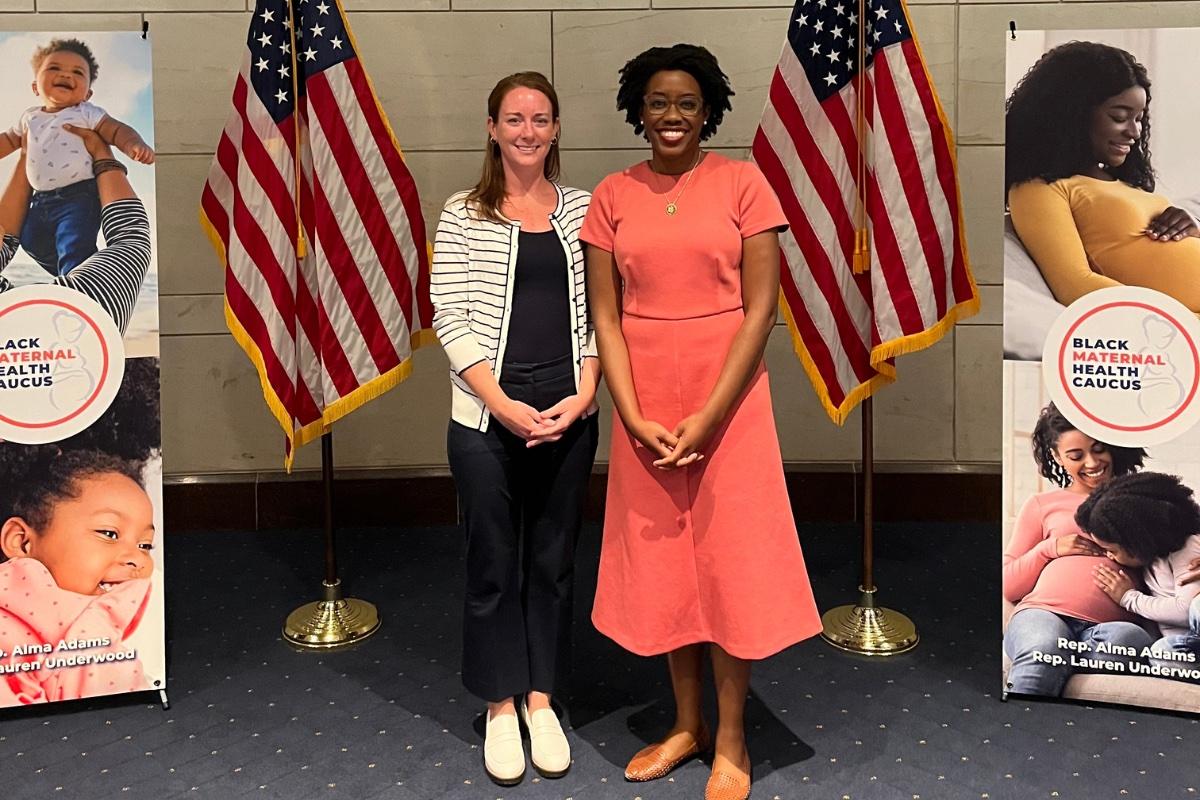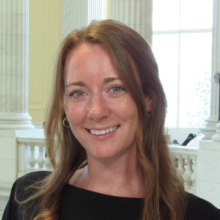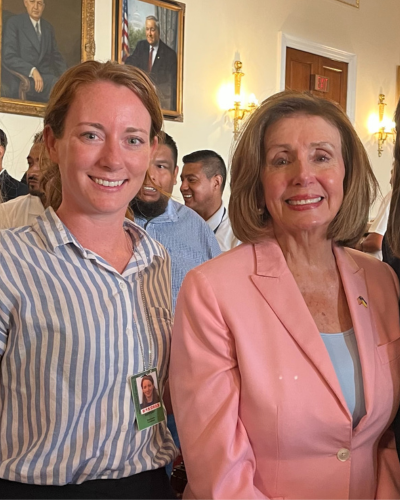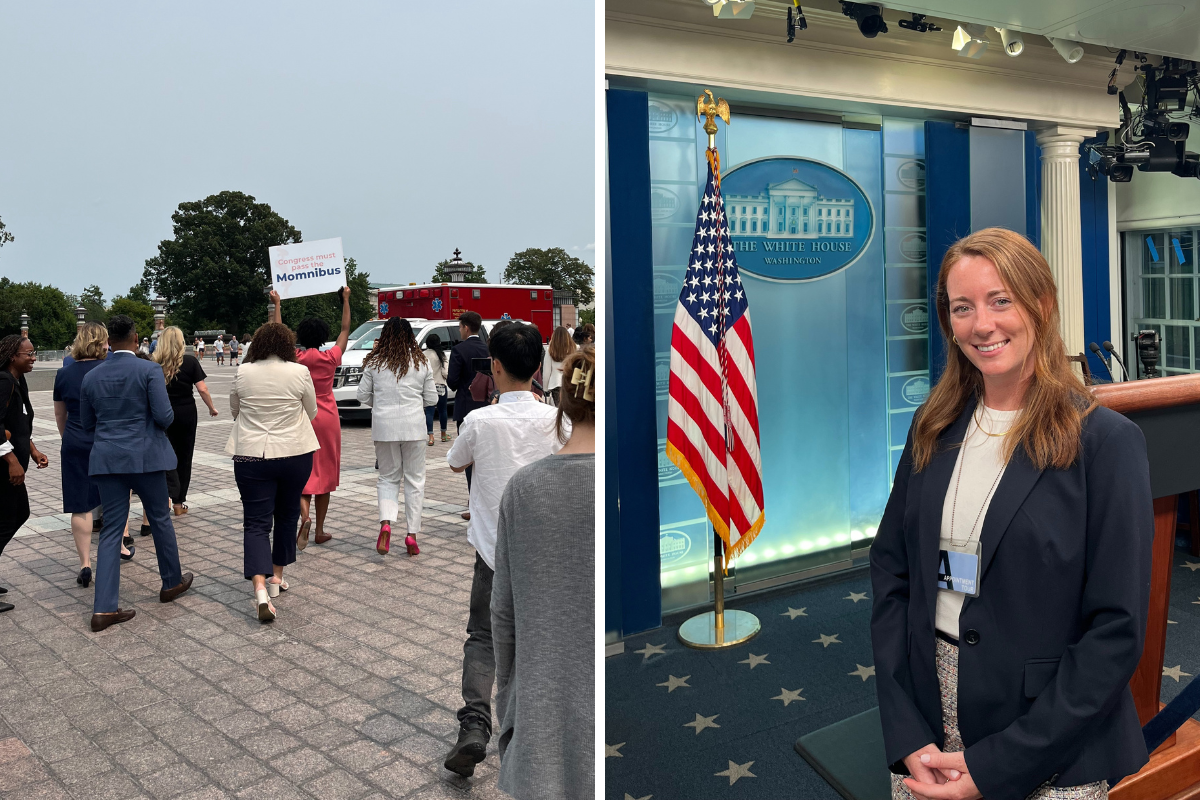
Stephanie Costelloe (left) meets Rep. Lauren Underwood at the Black Maternal Health Caucus 2023 Stakeholder Summit in Washington D.C. (Photo courtesy of Stephanie Costelloe.)
How UCSF Prepares Nurses to Transform Health Policy
Stephanie Costelloe, BSN, RN, spent this past summer in Washington D.C. as a health policy fellow for the House of Representatives, an opportunity made possible through the UCSF School of Nursing’s Health Policy and Public Health Nursing specialty.

She worked with the Democratic staff of the House Ways and Means Health Subcommittee on initiatives to expand and improve Medicare and health care access, including mental health and consumer assistance programs. Costelloe developed talking points for congressional hearings, researched health care topics to inform staff and legislators when drafting and debating legislation, attended conferences and hearings, and more.
For Costelloe, the summer residency experience confirmed what she was experiencing as an ICU nurse and a School of Nursing student: “Upstream, policy-based solutions are required to truly address health disparities, and it’s imperative that nurses have a seat at the table in policy work.”
Training That Combines Health Policy and Public Health
Through coursework and hands-on learning, the Health Policy and Public Health nursing specialty at UCSF prepares nurses to create or change systems, institutions and policies to enable all people to be healthy.
“We focus on the complex interactions between health and the structural determinants of health with a commitment to advancing racial, social and environmental justice, as well as health equity,” explains Kate Holbrook, MS, CNS, PHN, assistant professor and specialty co-coordinator.
One of the first of its kind in the nation, the specialty is currently accepting new applicants through the school’s BSN Entry to the Doctor of Nursing Practice - Advanced Nursing Focus pathway. In this pathway, individuals with a bachelor’s degree in nursing choose from among 10 specialty options in which to study while simultaneously working to achieve the Doctor of Nursing Practice degree, which is the highest clinical degree in the nursing profession.

To enroll, students must be a licensed registered nurse in the state of California. The RN requirement sets the specialty apart from other health policy programs across the country.
The curriculum’s specialty components integrate health policy with the practice of promoting and protecting the health of populations, using knowledge from nursing, social and public health sciences. This combination prepares nurses to engage in both health policy and public health, promote health equity and have a greater impact on the health of populations.
Sample courses include:
- Climate Change, Health and Social Justice which explores how climate change impacts health, equity and social issues like the environment.
- Global Community Health Planning and Interventions which delves into frameworks for planning and assessing interventions to improve the health of communities, with a focus on vulnerable communities and global health.
- Race and Class Factors in Health Care Delivery which examines the impact of race and class on access to health care services and on those delivering care.
The specialty’s commitment to advancing health equity is what drew Marie Gourdet, MS ’22, RN, alumna of the Health Policy and Public Health specialty. “I have encountered and observed racialized health disparities, inequities and discrimination in health care as a Black woman and an emergency department nurse,” she says. “These experiences inspired me to become more engaged in public health policy and to pursue further education in the field.”
Hands-On, Immersive Experiences
In addition to coursework, the specialty requires that students complete a practicum in policy or public health. The experience is tailored to the unique interests and career goals of each student. The specialty places students, based on their interests, with advocacy and policy organizations, professional associations, health care organizations and more to receive on-the-ground training while learning about future career paths and building a professional network.


“Students gain valuable, hands-on experience working alongside the leadership of an organization and producing work that benefits the host organization,” says Susan Chapman, PhD, RN, FAAN, professor and specialty co-coordinator.
A desire to understand the federal legislative process brought Costelloe to Capitol Hill for her residency experience. Through conducting research on health issues for legislators, drafting background documents and preparing talking points for policy hearings, she gained new appreciation for the complex legislative process and the art of navigating it.
She also had the opportunity to meet with Rep. Lauren Underwood, one of only two members of Congress who is also a registered nurse; attend the Black Maternal Health Caucus 2023 Stakeholder Summit; participate in National Academy of Science policy briefings, and more.
“As the only person on the House Ways and Means Health Subcommittee with a nursing background, it was incredible to apply my years of bedside nursing experience and the policy knowledge I’d gained in my UCSF classes to current situations in the federal policy arena,” says Costelloe.
Impacting Policy From Every Setting
There’s a common misconception that to address health policy and public health issues, nurses must move away from the bedside or the hospital setting, says Chapman. “This specialty provides a set of skills, knowledge and population-based information that can be applied to any setting.”
Graduates from UCSF have gone on to work in hospitals; local and state health departments; county, state and federal legislative and regulatory offices; advocacy groups; government health organizations and more. They conduct program planning and evaluation, policy development and research, education programming and consultation.
While some graduates pursue policy full-time, others stay in their same organizations and move up the ladder or apply their policy skills at the unit or organizational level. “But all of them end up with a different perspective on their role,” explains Chapman.
Costelloe agrees. “I feel more confident because I know the data and the research to support my advocacy of patients,” she says. “There’s never a day when policy doesn’t matter.”




